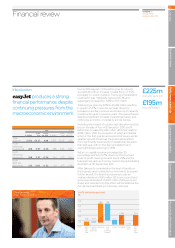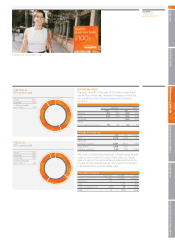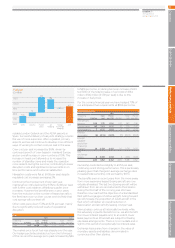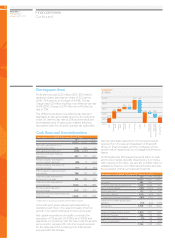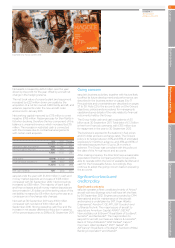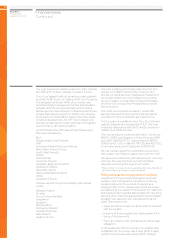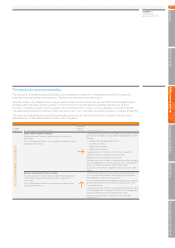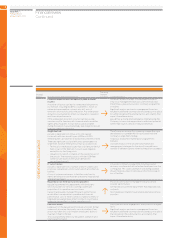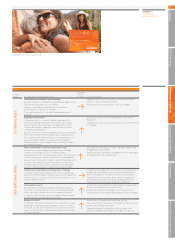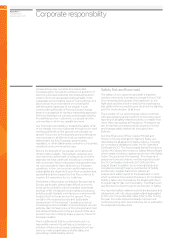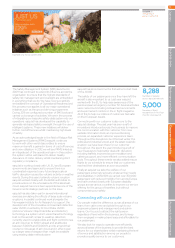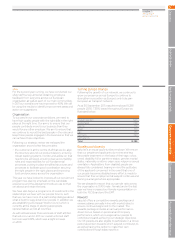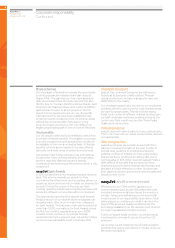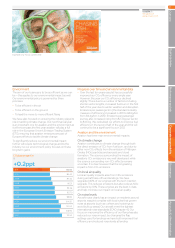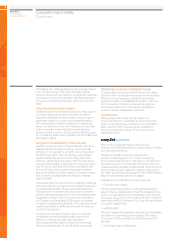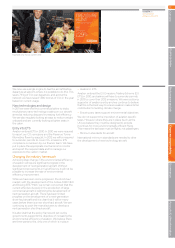EasyJet 2011 Annual Report Download - page 31
Download and view the complete annual report
Please find page 31 of the 2011 EasyJet annual report below. You can navigate through the pages in the report by either clicking on the pages listed below, or by using the keyword search tool below to find specific information within the annual report.
easyJet plc
Annual report
and accounts 2011
Overview Business review Performance and risk Corporate responsibility Governance Accounts & other information
29
Strategic
impact Risk description and potential impact
Prevailing
inherent
risktrend Current mitigation
EXTERNAL RISKS
Competition and industry consolidation
easyJet operates in competitive marketplaces against both
flag carriers and other low-cost airlines.
Industry consolidation will affect the competitive
environment in a number of markets.
This could cause a loss of market share and erosion of
revenue.
p
Regular monitoring of competitor activity and potential
impact of any consolidation activity.
Rapid response in anticipation of, and to, changes.
Regulator intervention
The airline industry is currently heavily regulated, with
expected increased regulator intervention; this includes
environmental, security and airport regulation in which
charges are levied by regulatory decision rather than by
commercial negotiation.
easyJet is exposed to various regulators across our network,
which will increase as the Company grows geographically.
This could have an adverse impact to our reputation, cost
base and market share. An inadequate knowledge or
misinterpretation of local regulations could result in fines or
enforcement orders.
i
easyJet has a key role in influencing the future state of
regulations.
A Regulatory Affairs Group coordinates the work and effort
in this area.
REPUTATIONAL RISKS
Major shareholder / investor relationship issues
easyJet has a major shareholder (easyGroup Holdings
Limited) controlling over 25% of ordinary shares.
Shareholder activism could adversely impact the reputation
of the Company and cause a distraction to management.
easyJet does not own its company name or branding which
is licensed from easyGroup IP Licensing. As for all brand
licensees, the easyJet brand could be impacted through
actions of the easyGroup or other easyGroup licensees.
i
Dedicated Investor Relations team, utilising a shareholder
engagement programme.
Significant Board and Senior management time dedicated
to engage with major shareholders.
Ineffective or non delivery of the business strategy
A number of key projects have been set up to deliver key
elements of the strategy. If these projects do not deliver the
benefits and cost savings planned we could fall short of our
planned financial results.
p
Programme management office (PMO) and experienced
project teams have been set up to oversee delivery and
track the budget and benefits realisation of all projects.
Steering Group set up with full key senior management
involvement to ensure monitoring, challenge and key
decisions are being made at the appropriate level.
Information security
easyJet faces external and internal information security
risks. The Company receives most of its revenue through
credit cards and operates as an e-commerce business.
A security breach could result in a material adverse impact
for the business and reputational damage.
i
Systems are secured and monitored against unauthorised
access; this will receive continued focus.
Scanning software for fraudulent customer activity is
monitored and controlled by the Revenue Protection team.
Bribery Act 2010
The Bribery Act 2010 came into force in April 2011. To date
there are no precedents set in respect of how this will be
enforced. As with all companies, if we were found to be in
breach of the Act this could adversely affect us financially
and reputationally.
i
easyJet has a strong ethical tone from the top.
Risks assessments have been completed and appropriate
actions taken where necessary.
General awareness training has been provided, with
additional targeted training given to higher risk groups.
Example only. Not a current offer.


